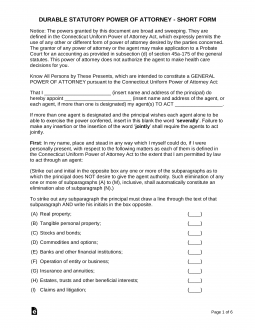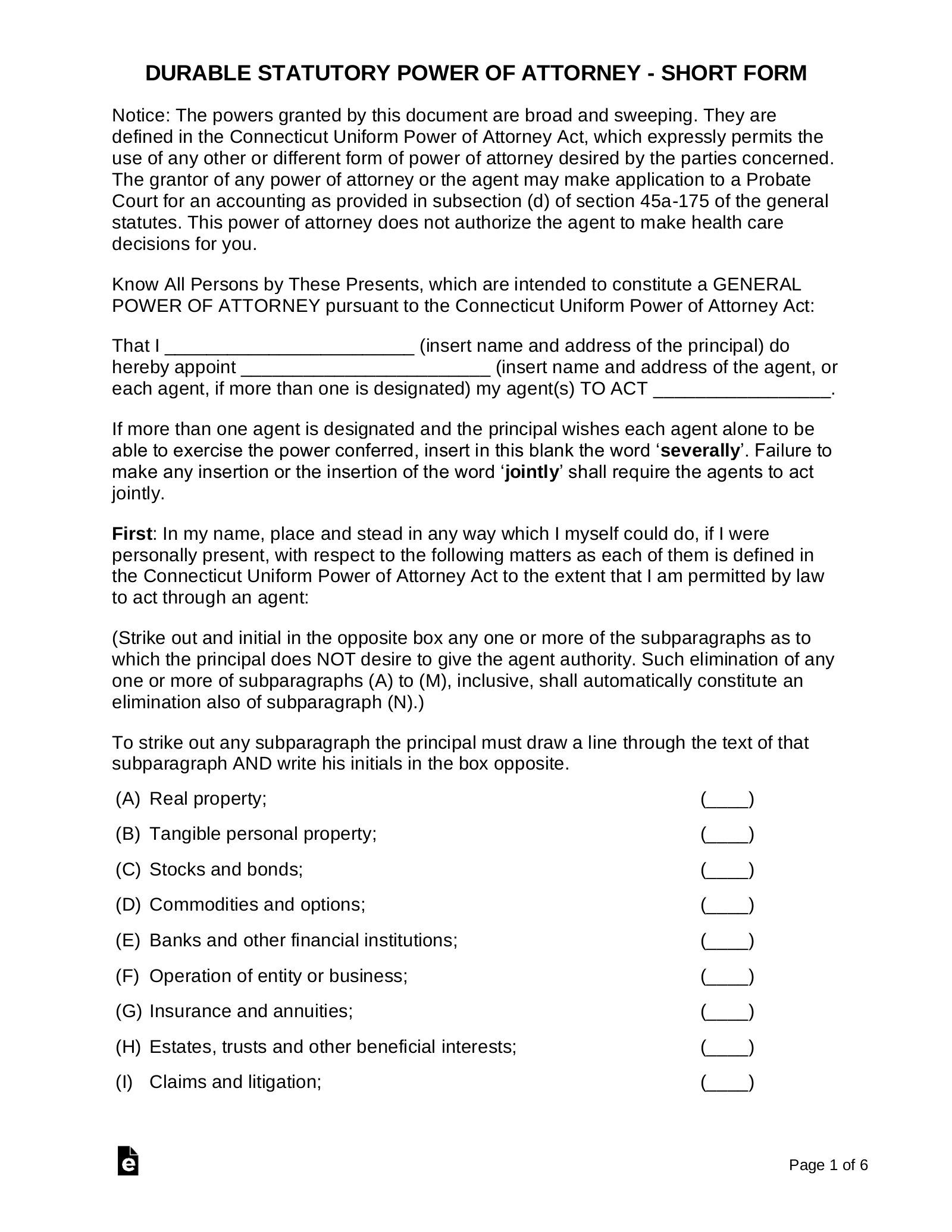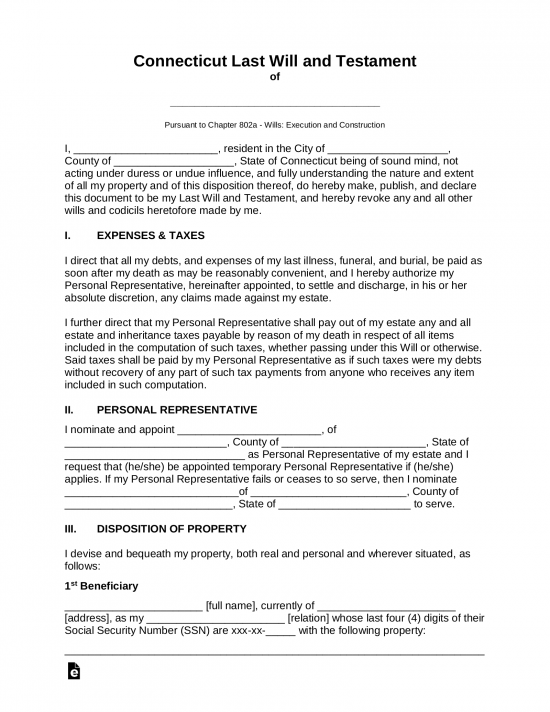Updated September 12, 2023
A Connecticut durable statutory power of attorney form lets a principal appoint an agent to handle their financial affairs during their lifetime. The term “durable” refers to the form remaining legal for use even if the principal can no longer make conscious decisions or think with a clear mind. It is recommended the agent selected is the main beneficiary in the principal’s last will and testament or a highly trusted individual.
Table of Contents |
Versions (2)
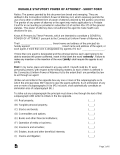 Durable Statutory Short Form Power of Attorney
Durable Statutory Short Form Power of Attorney
Download: PDF, MS Word, OpenDocument
Durable Statutory Long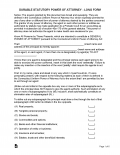 Form Power of Attorney
Form Power of Attorney
Download: PDF, MS Word, OpenDocument
Laws
Chapter 15c (Uniform Power of Attorney Act)
Definition of “Durable”
“Durable” means, with respect to a power of attorney, not terminated by the principal’s incapacity (Sec. 1-350a(2)).
Definition of “Power of Attorney”
“Power of attorney” means a writing or other record that grants authority to an agent to act in the place of the principal, whether or not the term power of attorney is used (Sec. 1-350a(7)).
Signing Requirements
The principal must sign with two (2) witnesses and a notary public. The agent also has the option to sign the Agent’s Certification in the presence of a notary public for further certification (Sec. 1-350d, Sec. 1-352a).
Statutory Form
Connecticut does have a statutory form located at Sec. 1-352 of the Connecticut General Statutes.
How to Write
Download: PDF, MS Word, OpenDocument
Connecticut Principal Declaration
(1) Principal Identity. The role of the Connecticut Principal in this document will be to deliver the authorization (to act in his or her name) to an Agent or Attorney-in-Fact. As the Party issuing this paperwork, you must identify yourself as the Connecticut Principal with a record of your full name and complete address.
(2) Agent Identity. After claiming the role of the Connecticut Principal, continue to record the full name of the Agent(s) that you are granting the principal authority to act on your behalf or in your name. You can name as many Agents or Attorneys-in-Fact as needed to complete your appointment of authority. This requires a record of each Agent’s name and address documented.
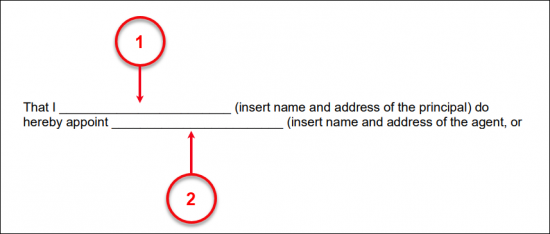
(3) Agent Cooperation. If you intend to grant your principal authority to more than one Agent (or Attorney-in-Fact) at the same time then, it is strongly recommended you also document if each Attorney-in-Fact is able to wield principal power independently of the other, if all Attorneys-in-Fact must come to a majority rule before engaging principal authority for action on your behalf, or if all Attorneys-in-Fact must agree unanimously before any principal act can be carried out.

First Article: Reviewing And Restricting Principal Authority
(4) Power Review. The first article delivers a list of the subjects that, by default, the Ohio Attorney-in-Fact will be granted the principal authority to act in by using your name. If you do not wish to grant one (or more) of these powers to your Attorney-in-Fact, then you must draw a horizontal line through the unwanted item and initial the area on its right. Only the powers that remain unmarked will be granted to the Attorney-in-Fact when you sign this document. Review items A through N and remove any that you do not wish included using this technique.
(5) Imposing Specific Limits. If desired, you can provide specific limitations to the principal authority this Ohio document grants when signed properly. For example, you may approve of certain actions on this list but not all actions, you may wish to add a specific topic not on the list, or you may wish to give a conditional statement to any such restrictions. An area where you can provide this information along with additional provisions (i.e., a specific effective date or termination event/date for this document) or instructions is available for your use.
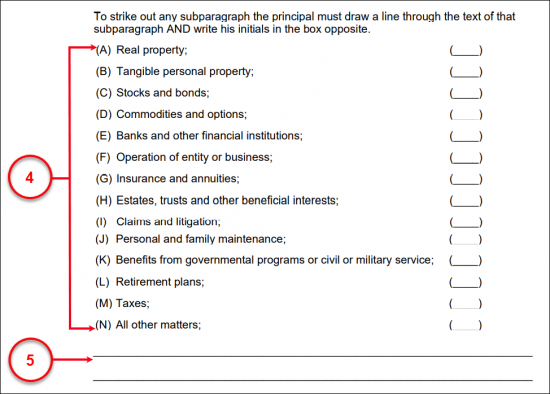
Fifth Article: Designation Of Successor Agent(s)
(6) Naming The Successor Agent. If you wish to ensure that someone is available to wield principal authority to carry out your directives even when your Ohio Attorney(s)-in-Fact are unable to, no longer approved (i.e., revocation), or unwilling to act for you then, it would be beneficial to have a predetermined Successor Agent set to receive principal power. This Successor Agent will only be able to become your Ohio Attorney-in-Fact if his or her name is provided in this form and the Attorney-in-Fact role is vacant.

(7) Naming The Second Successor Agent. An additional precaution involves anticipating that your Successor Agent may be unable to assume the Ohio Attorney-in-Fact role. For this reason, a Second Successor Agent should be named. This Party can only assume principal authority when the originally named Attorney-in-Fact steps down, is revoked, or unable to wield your principal powers effectively.

Sixth Article: Designation Of Conservator Of Estate
(8) Nominate Your Estate’s Conservator. An optional area provided by this template allows for the nomination of a Guardian to your Estate. Connecticut State may decide to appoint this Entity to safeguard your interests during extenuating circumstances. While the Party named to this role is strictly up to the courts, you may use this form to formally nominate a specific person to act as your Conservator if this becomes necessary.
(9) Second Conservator Nomination. If the Connecticut Courts determine that your nomination should be appointed as the Conservator of your estate, but your Nomination is unavailable or unwilling to accept this role, then a Second Nomination may be considered. To take advantage of this option, you must report the name of the Second Conservator Nomination after re-entering your First Nomination’s name to the first two lines of the statement discussing these Parties. Both items are needed to complete the language that must be used for this goal.

(10) Define Conservator Status. Indicate if you require that a Conservator to your estate is bonded by marking the appropriate checkbox with an “X.”

Seventh Article: Effective Date And Signature
(11) Date Of Execution. By default, your signature date is the calendar date when this document becomes effective. This allows your Attorney-in-Fact to access principal powers immediately upon your signing. It should be noted that even if you have named a different effective date, your signature date remains of vital importance as it establishes when your intent to grant principal powers was finalized. Record your signature date as the current date on the day you sign this document.
(12) Signature Of Principal. Your signature must be provided in a manner that is provable. For this reason, two Witnesses and a Notary Public must watch you provide this item.
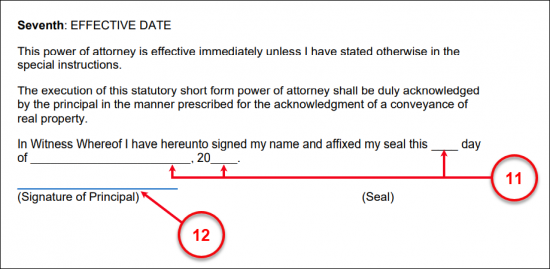
(13) Witness Verification. Two Witnesses must also sign their names as a testimony to the authenticity of your signature.
(14) Notary Public Authentication. The process of notarization can only be carried out by the Ohio Notary Public who has observed your signing of this document. This process must be completed since it is mandatory for the proper execution of this appointment.
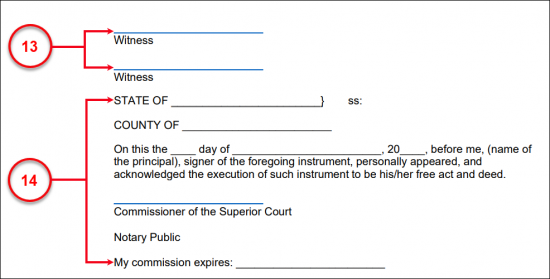
Agent’s Certification
(15) State Then County. Your Agent must also testify to the validity of your appointment. This process begins with the state and country where this declaration is made.

(16) Name Of Agent.
(17) Name Of Principal.
(18) Principal Signature Date. The signature date that was reported on the power document you issued will be used to identify it as the subject of the Agent’s statement.
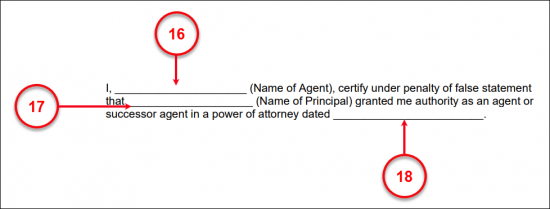
(19) Agent Statement. Any discussions that the Agent believes should be put to paper regarding the Principal (You) or the execution of the concerned power document must be provided before the Agent signs this statement.

(20) Signature And Acknowledgment. Your Agent must sign his or her name and document the current date to complete the testimony being made.
(21) Agent’s Name And Address. The printed name of the Signature Agent along with his or her address is required with the Agent name.
(22) Agent’s Telephone Number.
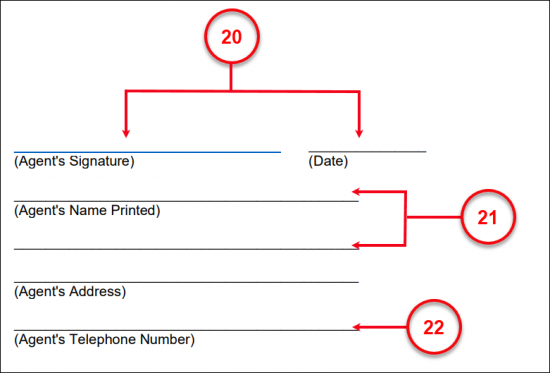
(23) Agent Signature Notarization. It is important that the notarization process for the Agent’s signature be engaged. Only a Connecticut Notary Public can complete the final area of this appointment.
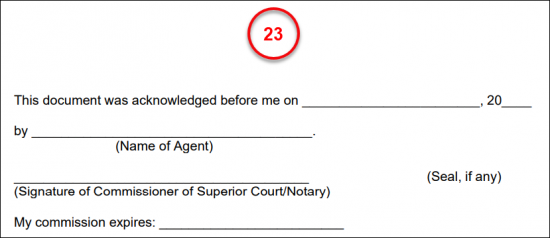
Related Forms
Download: PDF
Download: PDF

